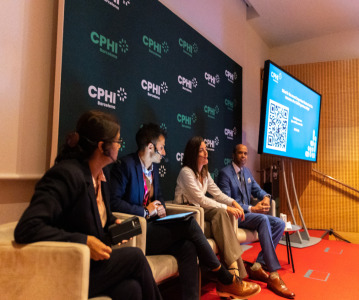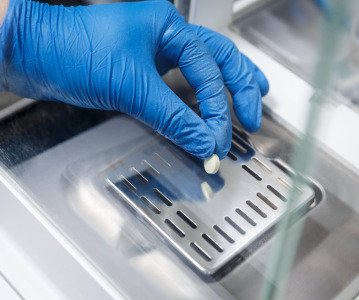A completely new way of delivering anti-cancer drugs
A completely new way of delivering anti-cancer drugs to tumours, using 'minicells' derived from bacteria, has been tested for the first time in humans and found to be safe, well-tolerated and even induced stable disease in patients with advanced, incurable cancers with no treatment options remaining.
A completely new way of delivering anti-cancer drugs to tumours, using 'minicells' derived from bacteria, has been tested for the first time in humans and found to be safe, well-tolerated and even induced stable disease in patients with advanced, incurable cancers with no treatment options remaining.
The research, presented at the 24th EORTC-NCI-AACR Symposium on Molecular Targets and Cancer Therapeutics in Dublin, Ireland, suggests that it could be possible to use this new technology for targeted delivery of other drugs to a range of cancers, and to personalise treatment by adjusting the drugs to suit the genetic make-up of each patient's tumour.
Dr Himanshu Brahmbhatt and Dr Jennifer MacDiarmid, the founders of EnGeneIC, a biotech company in Sydney, Australia, designed the minicells to deliver anti-cancer drugs directly to tumour cells, thereby reducing the toxic side-effects that are seen when chemotherapy is given to patients systemically. The minicells are created from small bubbles of cell membrane pinched off the surface of mutant bacteria. The minicells can then be loaded with chemicals, such as anti-cancer drugs, and coated with antibodies that home in on receptors on the surface of tumour cells. This means that the minicells target the cancer cells, while avoiding normal cells that do not have the same receptors. The cancer cell recognises the bacteria from which the minicell has been derived and activates its standard defence by swallowing the minicell, which exposes the cell nucleus to whatever cancer-killing drug the minicell is carrying.
Each minicell is about 200 times smaller in diameter than a human hair (it measures 400 nanometres (nM) - a nM being one billionth of a metre). "Nonetheless, this is much larger than synthetic particles in development for drug delivery," said Associate Professor Benjamin Solomon (MBBS, PhD, FRACP), the principal investigator of the trial and a consultant medical oncologist at the Peter MaCallum Cancer Centre in Melbourne, Australia. "This larger size means that the minicells preferentially fall out of the leaky blood vessels around the tumour and do not end up in the liver, gut and skin where they could cause nasty side-effects like smaller particles do."
Work in the laboratory and in animals had already shown that the minicells worked in the way they were designed to, but the trial presented today is the first time that they have been used in humans.
Professor Solomon said: "In this study we loaded the cells with a cytotoxic chemotherapy drug called paclitaxel (which is currently used in many tumour types) and coated the minicells with an antibody targeting the loaded minicells to tumours expressing the Epidermal Growth Factor Receptor (EGFR) - a protein that is found on the surface of many cancer cells. The study was then conducted in the way standard phase I studies are conducted to determine the safety and toxicity of minicells by treating small groups of patients with progressively higher doses of minicells and closely monitoring safety and toxicity."
A total of 28 patients with advanced, incurable cancers were treated with the minicells in four centres in Australia. Ten patients had stable disease at six weeks and received more than one cycle of minicells.
"The key finding of the study is that minicells can be given safely to patients with advanced cancer," said Prof Solomon. "Additionally, we showed that we could give multiple doses and one patient received 45 doses over 15 months. The major toxicity we observed was a mild self-limiting fever seen on the day of the infusion with little or no side-effects seen in the remainder of the following week. At higher doses we found that there were additional side-effects, in particular changes in liver function tests, which, although asymptomatic, prevented us from raising the doses of the treatment higher.
"This important study shows for the first time that these bacterially-derived minicells can be given safely to patients with cancer. It thereby allows further clinical exploration of a completely new paradigm of targeted drug delivery using this platform coupled with different 'payloads' of cell-killing drugs or other treatments such as RNA interference, and with different targeting antibodies."
He concluded: "The minicell technology is a platform for the targeted delivery of many different molecules, including drugs and molecules for silencing rogue genes which cause drug resistance in late stage cancer. The technology can also be viewed as a powerful antibody drug conjugate where up to a million molecules of drug can be attached to targeting antibodies and delivered to the body in a safe way. In the future this will enable a truly personalised medicine approach to cancer treatment, since the minicell payload can be adjusted depending on the genetic profile of the patient."
Phase II trials of the minicells are now being planned, including a trial in patients with glioblastoma (a type of brain tumour) using minicells loaded with doxorubicin. The researchers also want to develop imaging methods to track the minicells in patients.
Professor Stefan Sleijfer, the scientific chair of the EORTC-NCI-AACR Symposium, from Erasmus University Medical Centre (The Netherlands), commented: "Approaches resulting in selective delivery of anti-cancer drugs to tumour cells is highly interesting as it may lead to a reduction in adverse side-effects and improved anti-tumour activity. In this respect, the use of 'minicells' is a novel and promising technique."
Related News
-
News Women in Pharma: Our hopes for 2025 and beyond
Our last instalment for 2024 of the Women in Pharma series brings you messages direct from the Informa Markets CPHI team as they discuss the advice and insights they have carried throughout their roles working at CPHI, and what they hope to see for the... -
News CPHI Milan 2024 - From the Floor
Milan and CPHI welcome you to 2024 CPHI Milan! As we celebrate the 35th edition of our flagship CPHI show, editors Vivian Xie and Lucy Chard bring you the latest from the show floor, conference sessions, and innovative solutions from all exhibitors, at... -
News The BIOSECURE Act: implications for the pharma supply chain
On September 9, 2024, the US House of Representatives voted to pass the bill titled the BIOSECURE Act (the Act), which lists several Chinese companies in the pharmaceutical supply chain. The Act will prohibit American companies from contracting or doin... -
News A Day in the Life of a Global CDMO Chapter Lead – Manufacturing
The 'Day in the Life of' series has covered many aspects of the pharmaceutical pipeline, including R&D and procurement, now we're taking a look at manufacturing from a global CDMO perspective. -
News CPHI Milan Speaker Spotlight: CDMO relations with Pharma and Start-Ups
In the run-up to CPHI Milan, we sit down with some of the experts and thought-leaders speaking at this year’s conferences. -
News Women in Pharma: Advocating for trans healthcare in pharma
In our monthly series on women in the pharmaceutical industry, we interview leading experts in the pharmaceutical supply and value chain to discuss the importance of gender diversity in healthcare, the workplace, and beyond. -
News Updated – Changing abortion pill access according to the US FDA and Supreme Court
After the approval of the medical abortion pill, mifepristone, by the US FDA, states across the USA approach the distribution of the pill differently, some ruling against allowing access to the drug. -
News CPHI North America 2024 – From the Floor
Welcome to Philly! CPHI North America once again graces the Philadelphia Convention Center, 7–9 May 2024.
Recently Visited
Position your company at the heart of the global Pharma industry with a CPHI Online membership
-
Your products and solutions visible to thousands of visitors within the largest Pharma marketplace
-
Generate high-quality, engaged leads for your business, all year round
-
Promote your business as the industry’s thought-leader by hosting your reports, brochures and videos within your profile
-
Your company’s profile boosted at all participating CPHI events
-
An easy-to-use platform with a detailed dashboard showing your leads and performance
.png)




.png)

